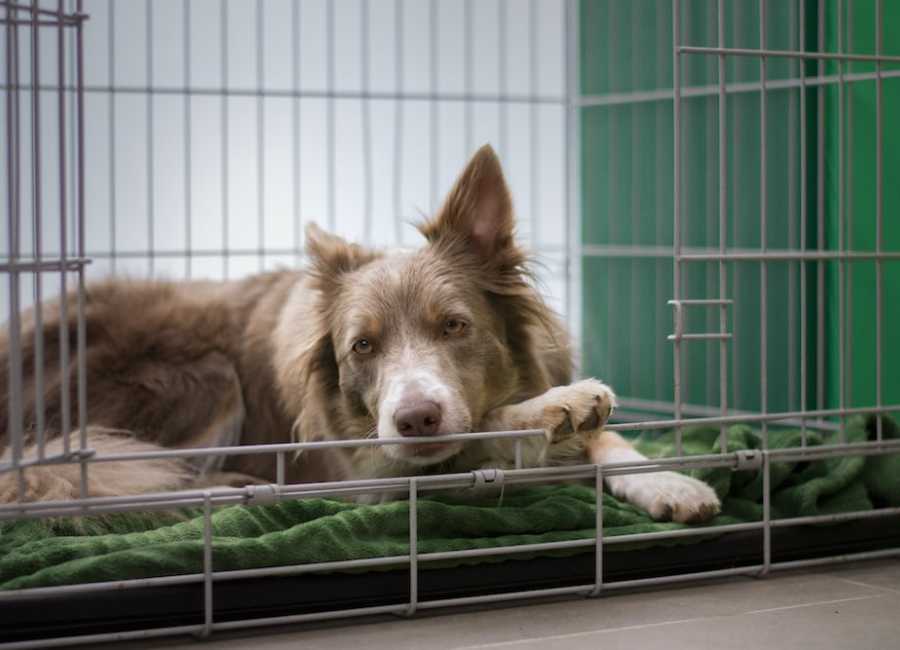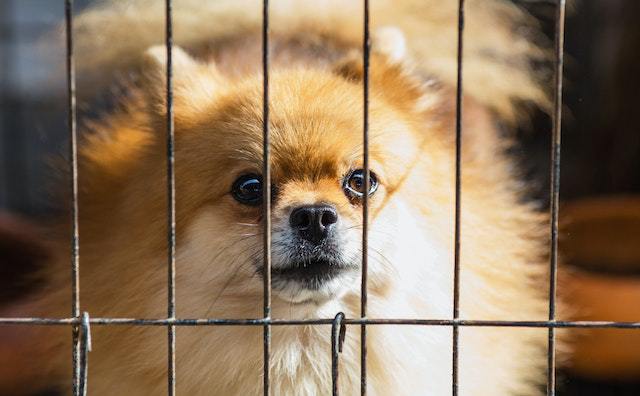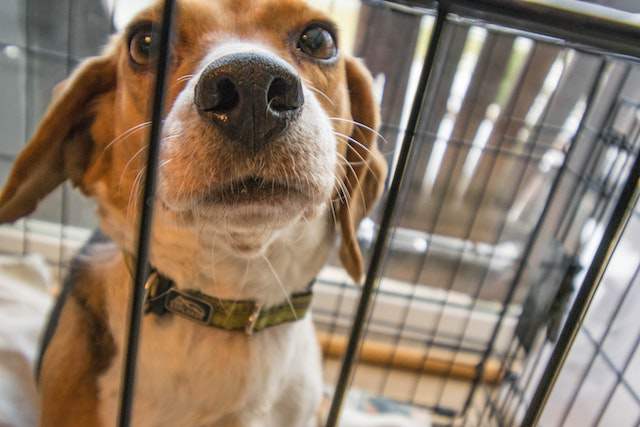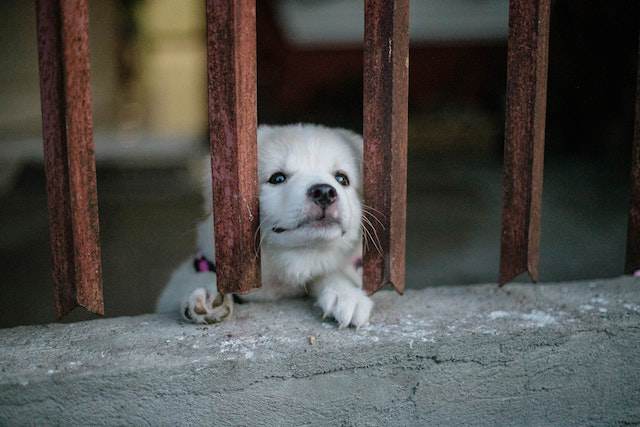10 Reasons For New Puppy Crying in Crate at Night & Tips

Hey there, fellow dog lovers! Are you a new pet parent experiencing the struggle of your puppy crying in their crate at night?
We know it can be tough to hear those sad whimpers and not know how to help. But fear not, we’ve got some tips and tricks to make those sleepless nights a thing of the past.
So grab a cup of coffee and keep on reading!
Why is My New Puppy Crying in Crate at Night
A new puppy may cry in their crate at night due to feeling anxious, scared, or lonely, and providing a comfortable and cozy crate can help alleviate these feelings and make the puppy feel more secure.
Additionally, it is important to establish a consistent routine with the puppy and gradually increase its time in the crate to help it adjust.
Let’s take a deep dive into why a new puppy may be crying in the crate at night…
Reasons for a New Puppy Crying in Crate at Night

The following are some common reasons for a new puppy crying in crate at night and how to fix it:
1. Separation Anxiety
Puppies frequently struggle with separation anxiety, especially if they are introduced to a new environment without their littermates.
Leaving them alone in the crate at night can make this anxiety worse. They express their fear and discomfort by crying and acting upset.
It’s crucial to gradually accustom your puppy to the crate in order to address this. To begin building positive associations, leave the crate open during the day and fill it with treats and toys.
Gradually extend the amount of time your puppy spends in the crate while rewarding calm behavior with treats and praise.
Learn more about stopping a puppy from barking when left alone.
2. Loneliness and Fear
Puppies are social creatures who thrive on company. Being alone in the crate at night can cause feelings of loneliness and fear, which can result in crying.
To counteract this, place the crate in a central location where your puppy can still feel connected to you and your family.
Leave a piece of your clothing with them to provide a familiar scent and a comforting presence.
Introducing a soft toy or a snuggle buddy can also mimic their littermates’ warmth and comfort.
3. Need for Bathroom Breaks
Young puppies have limited bladder control, and their need to eliminate may account for their nighttime cries.
They could be indicating that they need to relieve themselves outside. It is critical to develop a consistent bathroom routine.
Just before bedtime, take your puppy out for a bathroom break. Before putting them in the crate, keep an eye on their water intake and make sure they have a chance to eliminate them.
Respond quickly and take them outside for a brief bathroom break, keeping interactions quiet and low-key.
Learn more about potty training a puppy.
4. Hunger or Thirst
Puppies’ stomachs are small, so they may require more frequent feedings. If they are hungry or thirsty, they may cry and whine to express their needs.
To address this, make sure your puppy is well-fed and hydrated before going to bed.
Consider giving them a small, balanced meal a few hours before bedtime, and keep water available until closer to bedtime. This will help to prevent nighttime crying due to hunger or thirst.
Learn more about why your puppy is not eating.
5. Discomfort or Pain
When puppies are in physical discomfort or pain, they may cry. This could be due to an upset stomach, teething, or any other health-related discomfort.
If you suspect your puppy is in pain, make an appointment with a veterinarian to rule out any underlying health issues.
Providing appropriate chew toys can help alleviate teething discomfort. Also, make sure the crate is comfortable, with soft bedding and adequate ventilation.
A comfortable and secure environment can help your puppy feel better physically.
Learn more about a 4-month-old puppy crying when left alone.
6. Temperature Regulation

Puppies are temperature sensitive, and extreme heat or cold can make them feel uneasy. Their sobbing could be an attempt to express their discomfort.
Keep the crate in a well-ventilated area away from drafts and direct sunlight to avoid this. Use a crate pad or blanket for insulation and temperature regulation.
Consider using a fan or heater to maintain a comfortable environment, depending on the weather.
7. Unfamiliar Sounds or Noises
Puppy exposure to unfamiliar sounds, such as traffic noise, household appliances, or other pets in the house, can occur in new environments.
These noises may startle and confuse them, resulting in anxiety and tears. Introduce different sounds to your puppy gradually and in a controlled manner.
To simulate these sounds, use recordings or videos, and provide positive reinforcement through treats and play.
They will eventually become desensitized, and the sounds will no longer bother them.
8. Uncomfortable Crate Training Experience
If your puppy had a bad crate training experience, such as being forced into the crate or being left alone for an extended period of time, they may develop a phobia of the crate and cry at night.
Reintroduce crate training with patience and positive reinforcement to overcome this.
Associate the crate with treats, praise, and comforting items to make it a pleasant and inviting space. Increase crate time gradually, making sure your puppy feels safe and relaxed.
Learn more about socializing your puppy.
9. Lack of Routine and Consistency
Puppies thrive on consistency and routine. If their daily schedule is unstructured, it can cause confusion and anxiety, which can lead to nighttime crying.
Create a daily routine for feeding, exercise, playtime, and crate time. This predictability will make your puppy feel safer and less anxious at night.
10. Lack of Exercise and Mental Stimulation
Puppies have a lot of energy, and if they don’t get enough exercise or mental stimulation before bedtime, they may become restless and cry in their crate.
To avoid this, make sure your puppy gets plenty of playtime and exercise during the day.
To keep puppies mentally stimulated, provide puzzle toys, chew toys, or treat-dispensing toys.
A tired puppy is more likely to relax and sleep soundly through the night.
Learn more about how to stop a puppy from crying in a crate.
How to help a new puppy adjust to its crate at night

Here are some common tips for helping a new puppy adjust to their crate at night.
1. Introduce the crate gradually
Allow your puppy to get familiar with the crate gradually. Start by leaving the crate door open and let your puppy explore the crate on their own. Place some treats and toys inside the crate to make it more appealing.
2. Make the crate comfortable
Ensure that the crate is comfortable and cozy by adding blankets and pillows. This will make the crate a welcoming environment for your puppy.
3. Associate the crate positively
Encourage your puppy to associate the crate with good things such as treats, toys, and comfy bedding. This positive association will help them feel more comfortable and secure in their crate.
4. Start crate training during the day
Start crate training during the day when you can monitor your puppy. This allows you to help your puppy adjust to the crate in a more controlled environment.
5. Set a routine
Establish a routine for your puppy that includes spending time in their crate. This will help them become more comfortable and familiar with the crate.
6. Avoid giving attention at night
Avoid giving your puppy attention if they whine or bark at night. This can reinforce bad behavior and make it more difficult for them to adjust to the crate.
7. Gradually increase crate time
Gradually increase the amount of time your puppy spends in their crate at night. This allows them to adjust to spending longer periods of time in the crate without feeling anxious or stressed.
8. Provide company
Consider placing the crate in your bedroom so your puppy can sleep near you. This provides them with a sense of security and can help calm their anxiety.
9. Don’t rush the process
Be patient and don’t rush the crate training process. Every puppy is different, and it may take some puppies longer to adjust to the crate than others. Take your time and be consistent with crate training, and your puppy will eventually learn to love their crate and feel secure in it.
Learn more about how to help your puppy sleep better.
Related Questions
Should I let my puppy cry it out in the crate at night?
While it’s tempting to let your puppy cry it out in the crate at night, it’s not recommended. This can lead to increased anxiety and stress for your pup. Instead, try to address the underlying cause of the crying, such as giving them a comfortable bed and toys or taking them out to pee before bedtime.
How long will my puppy cry in the crate at night?
The amount of time your puppy will cry in the crate at night varies depending on the individual dog. Some puppies may cry for only a few nights, while others may take longer to adjust. Be patient and consistent with your training, and consider seeking professional advice if your puppy continues to cry excessively.
Can I comfort my puppy when they cry in the crate at night?
Yes, it’s perfectly okay to comfort your puppy when they cry in the crate at night. Offer them affection and reassurance through the crate bars, or consider placing a T-shirt or blanket of yours in the crate with them for comfort.
Should I move the crate to a different room?
If your puppy is crying in the crate at night, it may be because they feel isolated or scared in a separate room. Moving the crate to your bedroom, at least for the first few nights, can help your pup feel more secure and close to you.
What if my puppy continues crying in the crate at night?
If your puppy continues crying in the crate at night, it may be a sign of a more significant issue, such as anxiety or discomfort. Consider seeking professional advice from a veterinarian or dog trainer to help you address the issue and find a solution that works for you and your pup.
Conclusion
It can be tough hearing your new puppy crying in their crate at night, but remember that it’s completely normal behavior for them.
They just need some time to acclimate to their new surroundings and develop a sense of security.
Make sure they have a comfortable bed and some comforting toys in their crate, and try feeding them meals in it during the day to create a positive association.
With patience and love, your furry friend will soon feel right at home. So, don’t worry too much – just keep being a loving and supportive owner, and your new puppy will be happy in no time!
